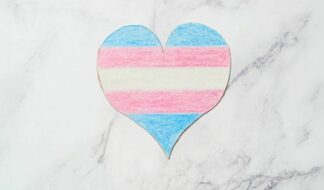PGN Staff Reports
Philadelphia, PA – The national LGBT community suffered a profound loss when a fearless and groundbreaking civil-rights defender passed away this week.
Barbara Gittings, a pioneering gay activist, died after a seven-year battle with breast cancer on Feb. 18. She was 75.
Gittings began her activist career in 1958 when she established the first East Coast chapter of Daughters of Bilitis, the first lesbian organization in the country.
A powerful voice in the gay liberation movement, Gittings was a lifelong activist, promoting the visibility of gays and lesbians, and standing up for civil rights in the mid-1960s, when most gays were still closeted and homosexuality was generally unacceptable.
"We can't get anywhere if we're a hidden people," Gittings said in an August 2005 interview with Philadelphia Gay News. "I've always promoted visibility as the key to our success."
Through her years of activism, Gittings left a lasting impression on many.
"Barbara was the mother of our modern gay rights movement," said Pennsylvania Human Relations Commission chairperson, Steve Glassman. "She was a pioneer in so many ways including her ability to inspire people to look inside themselves and find their own personal courage in coming out and making a difference for all Americans. Meeting Barbara even once could make an impression on any future activist and allow them to see the future through her eyes."
"Barbara was a real pioneer who fought tirelessly in the name of human decency and dignity," said Governor Ed Rendell.
Gittings spent 46 years of her life with partner Kay Tobin Lahusen, a prominent activist and photojournalist.
The two met at a 1961 DOB organizing picnic in Rhode Island and were inseparable ever since, living in Philadelphia for more than 35 years and later in Wilmington, Del.
Although it was not love at first sight, both admitted it was pretty close.
Together, they created a meaningful life centered around activism in the LGBT community.
"Our relationship means the world to me," Lahusen said in 2005. "I can't imagine life without her."
Greatest accomplishments
Gittings said she was most proud of her editorial leadership of DOB's magazine, "The Ladder," and her work with both the American Library Association and the American Psychiatric Association to promote the portrayal of gays as healthy individuals.
As editor of "The Ladder" from 1963-66, Gittings transformed the publication into a cutting-edge magazine.
With Lahusen's help, she added "A Lesbian Review" to the title and featured prominent lesbians on the cover.
Together Gittings and Lahusen shook things up at the publication as they tried to show lesbians throughout the nation they were not alone.
Gittings also included more non-fiction book reports and better short stories and poetry in the publication.
Lahusen said DOB considered the pair militant and tried to censor them, claiming their journalism was based "too much in East-Coast activism."
Compared to West Coast gays and lesbians, Gittings was militant. She and Lahusen participated in early gay-rights protests — which she referred to as pickets — from 1964-69 in Philadelphia, along with other East Coast activists including Frank Kameny, Randy Wicker, Jack Nichols and others.
Ever aware of the importance of being seen as "normal" and "healthy" by the medical profession, Gittings was also at the forefront of the battle against the American Psychiatric Association, which defined homosexuality as a mental disorder.
During the 1970s, she served on a panel at the APA, challenging it to reconsider its description of homosexuality as a disease.
Along with Kameny, she produced gay-themed exhibits at APA conventions and arranged for a closeted gay psychiatrist from Philadelphia to speak at the 1972 convention.
Dr. H. Anonymous, who wore a wig, full-face mask and spoke into a voice-distorting microphone, gave the APA its most damning evidence in favor of changing its views. In late 1973, it removed homosexuality from its list of mental disorders.
In the early 70s, Gittings also became involved in the American Library Association's Gay Task Force to help make gay-friendly books available to the masses.
As a college freshman, Gittings turned to books to research homosexuality and better understand her feelings.
But in the 50s, libraries catalogued homosexuality under terms like "sexual perversion" and "sexual deviance" and non-fiction gay-friendly books were nowhere to be found.
"There wasn't a single book written by a homosexual about homosexuality that I could find, and the books were always so clinical and depressing," Gittings said. "It was always an unhappy life. This was me, but it didn't feel like me. There was nothing in these books about happiness."
The first material on homosexuality that Gittings found "enlightening" was Donald Webster Cory's 1951 book "The Homosexual in America," which she saw as a "call to arms."
She met with Cory who introduced her to a host of gay activism groups including ONE Inc., The Mattachine Society and eventually DOB, where she found a home in the movement.
When Gittings heard the Gay Task Force of the ALA was putting together a bibliography of books on gay and lesbian subjects in 1971, she went to the meeting even though she was not a librarian.
In fact, Gittings did not graduate from college — she dropped out of Northwestern University during her freshman year because she spent all her time in the library researching homosexuality instead of attending classes.
"Books had always meant a lot to me," Gittings said. "When I had the early bad experience with trying to find books about people like me, I could see we needed to get rid of the lies in the library. I referred to it as 'combating lies in the library.' Here was a chance to do something to change what had been my experience."
For the next 15 years, she served as the leader of the ALA Gay Task Force, working to compile bibliographies on gay and lesbian books and other materials, beginning with a handful and ending up with 563 items in 1980.
John Cunningham, who met Gittings through the ALA's Gay Task Force in 1975 said the activist will be sorely missed.
"She symbolized hope to the gay community," he said. "She was enormously energized and enthusiastic about changing society, and she did it with a sense of excitement and joy."
Cunningham added that her legacy can be found in the libraries she loved.
"She left behind books and articles and web sites filled with hopeful and affirming messages about what it really means to be gay. These sources are completely different from the material she encountered when she came out."
Her legacy in the literary world continues with the Barbara Gittings Lesbian Collection of circulating materials, opened at the Philadelphia Public Library's Independence Branch in 2001.
In 2003, The ALA awarded her its highest honor, an honorary lifetime membership.
In the beginning
Gittings was born in Vienna, Austria, where her diplomat father was stationed in 1932, and moved frequently as a child.
During most of her school years, she and her family lived in Wilmington, Del.
Her parents were Roman Catholic and her father, though she felt closer with him than her mother, was so religious and proper that when he found a copy of "The Well of Loneliness" in her room in the 1950s, he sent her a letter, telling her to destroy it.
"He wrote me a letter, even though I lived at home then, telling me the book was obscene and immoral and I should destroy it so no one else could get their hands on it," she said.
But still Gittings said she was her father's favorite child, and he admired her for moving to Philadelphia and making it on her own at the age of 19.
Gittings had a brother, who died in 1988, and a sister who is still alive but from whom she was estranged. Her father died of lung cancer in 1961 and her mother is also deceased.
Gittings preferred not to talk about her parents, saying Lahusen was all the family she needed.
"Our parents are dead and we don't keep up with our siblings, who are far apart from us geographically and otherwise," Gittings said. "We're happy to be family to each other, and happy with our family of choice, friends who share what's close to our hearts, our interest in the gay rights movement."
Gittings said she never formally came out to her parents, but in the later years of her life, her mother did acknowledge her relationship with Lahusen, affectionately referring to her as her "other daughter."
Gittings said she began to feel "the stirrings" in high school and she "carried the torch" for another girl for three years, but didn't know what it meant.
In a time when homosexuality was highly taboo, Gittings was honest about her same-sex attraction.
"I was probably open about my feelings because I was so naive," she remembered in 2005. "But I didn't take her hand in mine and say, 'I love you.'"
After being barred from the school's National Honor Society for her possible "homosexual tendencies" according to a teacher, Gittings realized she was homosexual in college in 1949 or 1950.
Armed with this information, she went to a psychiatrist to figure out if it was true, which the doctor confirmed, and she left satisfied with this diagnosis. Gittings declined an offer to be treated.
At home, she took a night class in abnormal psychology where she met someone with whom she had her first lesbian relationship.
"It was my first relationship and it didn't work out but it confirmed my feeling that I was homosexual," she recalled. "I realized this is how I'm going to live my life."
When Gittings began to understand that homosexuality was not wrong or perverted, as some at the time characterized it, activism became prominent in her life, overshadowing career advancement, a college education or material possessions.
Gittings and Lahusen both lived life on the fringes, sacrificing material wealth for social change, and acting as the voices of one of the last great civil-rights movements.
In her later years, Gittings remained active, singing with the Gay and Lesbian Association of Choruses — singing was another one of her great loves since childhood — and giving lectures and workshops on gay and lesbian issues around the country.
She also served as a member of Gay and Lesbian Alliance Against Defamation, Lambda Legal Defense and Education Fund, Parents and Friends of Lesbians and Gays, Human Rights Campaign, American Civil Liberties Union, Gay Lesbian Straight Education Network, Gay and Lesbian Victory Fund and Servicemembers Legal Defense Network.
Another large project in her later years was the organizing of more than 100 boxes of memorabilia from more than 55 years of gay activism that she and Lahusen accumulated.
The items will be donated to several institutions, with the bulk going to the New York Public Library.
A memorial service is currently being planned.
Donations in Gitting's memory can be made to Lambda Legal Defense and Education Fund, an organization that defends GLBT civil rights, 120 Wall Street, Suite 1500, New York, NY 10005-3905, www.lambdalegal.org or (212) 809-8585.









